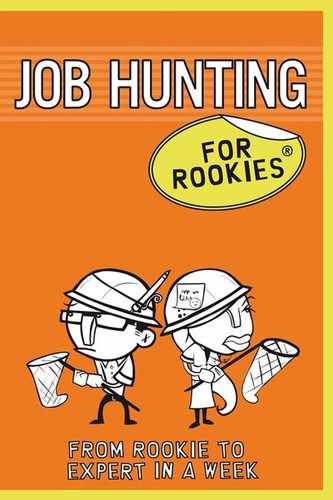CHAPTER 8
Chemistry, commitment
and cash: handling
interviewers’ concerns
Answering questions about chemistry during the interview
Interviewers want to figure out whether you will get on with the rest of the team. In order to convince interviewers that you are a likeable person who will quickly build new relationships and become an asset to the rest of the team, you need bear in mind only three key principles:
1. Be positive. For example, focus on what was good about your boss, colleagues and organization rather than dwell on what was wrong with them. Even if you didn’t get on with your last boss and are asked “What was your boss’s biggest fault?”, be sure to be positive. If you need to talk about the reasons you are leaving an organization, phrase your response in terms of what the new job will offer you rather than why you need to get away. Never speak ill of your current or previous colleagues, as it will only backfire and make you look like a whiner and bad-mouther.
2. Give short examples to back up your assertions. As with questions about your capability, anyone can make hollow claims. Would you necessarily believe someone who says “I get on well with everyone, as I know everyone loves me and they’d hate to lose me”? Perhaps not. But I know that I’d be more likely to believe candidates who can give reasons why they think they are popular, such as “I get on well with everyone – for example, I’m as likely to get invited out for lunch by our managing director as some of the junior assistants.”
3. Tell the interviewers the answer that you think they want to hear. When answering questions about your values or how much you socialize, bear in mind that different organizations may have different norms. For example, a small, entrepreneurial firm with an average age of 25 may place a lot more emphasis on having fun and socializing with each other; a large organization with many tens of thousands of staff and a much more conservative approach to business may take a dim view of too much socializing. So be careful to tailor your interview responses to what you think the interviewers are expecting to hear.
 Rookie Buster
Rookie Buster
Never speak ill of your current or previous colleagues, as it will only backfire and make you look like a whiner and bad-mouther.
Matching your manner with your words
Remember that chemistry is established not only by what you say but also how you say it (have a look back at Chapter 6). So, above all, you must allow your positive nature and enthusiasm to come to the surface when answering questions about how you deal with colleagues – both the ones you get on with as well as the difficult people in the team.
Demonstrating your commitment during the interview
Interviewers are on the lookout for candidates who want to work for their particular organization. After all, if you were looking to hire someone, wouldn’t you rather take on someone who desperately wants to work for you rather than someone who is simply looking for a job to pay the bills?
Putting across your dedication
Demonstrating your commitment through your interview answers is very simple to do. Simply follow these three rules:
1. Do your research on the organization. Be sure to read the organization’s website and any brochures or marketing literature. Do some online searches to find out about the organization, its competitors and the sector or industry in general. Have a look back to the section “Researching employers” in Chapter 2 for a reminder on how to research effectively.
2. Demonstrate your research by mentioning what you know about the organization in your interview answers. All the research in the world is of no use unless you can mention pertinent facts in your interview responses.
3. Make sure that you get across your passion and enthusiasm for working for the organization. Focus on the positive aspects of the organization or the work that draw you to the vacancy at this particular organization.
 Rookie Buster
Rookie Buster
All the research in the world is of no use unless you can mention pertinent facts in your interview responses.
Understanding how to answer specific questions on your level of commitment
Here are some of the commonest questions asked by interviewers and some advice on how to answer them:
Question: |
“Why do you want to work for us?” |
Advice: |
Choose two or three key features of this organization or the role and repeat them back to the interviewers. For example, if the organization prides itself on its training programme or the awards it has won, then mention them as part of your response. |
Question: |
“What do you know about our business?” |
Advice: |
Rather than repeat back everything you know about the organization, try to highlight a current issue facing it that you could help with. For example, perhaps the company is trying to expand and you have experience of having helped a previous organization to grow in size. |
Question: |
“Where do you see yourself in five years’ time?” |
Advice: |
Aim to discover in your research the likely career path for people who join the organization. You should then ideally be able to answer this question by saying that you would like to learn, grow and progress within the organization. |
Question: |
“How would you compare us to our competitors?” |
Advice: |
Look in your research for some way to compare this employer favourably with its competitors. Of course the interviewer believes that his or her organization is special – so you must respond by telling the interviewers why you believe this organization is better too. |
Question: |
“How would you describe your ideal job?” |
Advice: |
Avoid talking about what you might like to be doing (pop star, beauty contest judge, TV presenter, etc.). Instead, tell the interviewers that the role on offer with this organization fits many of your needs (for career development, stability, excitement, interesting work or whatever else you think is appropriate). |

Handling questions about cash
Everyone works to earn a living. But one of the unspoken rules of interviewing is that you should never bring the topic of money up.
Understanding the reasons not to talk about cash
Here are three reasons you should avoid bringing up money:
1. If you ask about the money too early on, you risk sounding like a candidate who is greedy and only interested in how much the job can pay. Interviewers prefer to hire candidates who are more interested in the intrinsic nature of the job, opportunities for career development, the brand of the organization and so on.
2. You risk pricing yourself out of the market. Mention your salary during the early stages of the interviewing process and the interviewers could decide to cut short the interview. In contrast, by waiting until you have won over the interviewers, you stand a better chance of having the interviewers reconsider how much they might be willing to pay for the right candidate (you!).
3. You may compromise your ability to negotiate a deal if you mention too low a figure. By waiting for the employer to mention how much the organization is willing to pay first, you gain an advantage in deciding how much to ask for.
 Rookie Buster
Rookie Buster
If you ask about the money too early on, you risk sounding like a candidate who is greedy and only interested in how much the job can pay.
Deflecting questions about cash
Your best option is to avoid discussing the issue of money at all. Talk about money only if the interviewer brings it up first. To get the job, aim to convince the interviewers that you are interested in the challenge of the job rather than just a big pay cheque.
If asked questions about money such as “How much do you earn?” or “How much will we need to pay you?”, try to deflect the questions. Consider the following examples:
• “What I hope to do is convince you that my salary requirements are not the main issue here. I’m more interested in finding the right opportunity to develop my skills within an organization that has a strong brand. If we can do that, then I’m sure we can both be flexible on salary.”
• “How much I earn isn’t the issue here. I’ve read so much about your proposed new products that I’m really keen to get involved. I think that my track record of having helped to launch new products in my current role would make me a real asset to the team.”
 Rookie Buster
Rookie Buster
Talk about money only if the interviewer brings it up first.
However, if the interviewer persists and asks a more pointed question about money, you may have to give a response. When forced to talk about money, try to give a range rather than a specific figure. And then go on to restate the fact that you are interested in this organization or role for particular, positive reasons. Consider:
• “I’m after something in the region of £22,000 to £25,000, but as I said earlier, the precise salary is less important than finding a job that will both challenge and develop me as a manager.”
• “I currently have a salary and bonus of around £33,000. However, I am more interested in securing a role such as this one that will give me direct client contact, which will allow me to progress towards my goal of moving into general management.”
 Rookie Buster
Rookie Buster
When forced to talk about money, try to give a range rather than a specific figure.
Fending off interviewers’ concerns
Many candidates have an area of weakness that they’d rather not talk about. Such issues include (but are not limited to):
• Having a gap in your employment record.
• Being deficient in terms of a particular skill.
• A history of poor health.
• The lack of a critical qualification.
• Being overqualified or too experienced for the job.
• Having left a previous employer under compromising circumstances, such as being fired or having clashed with a previous boss.
Most candidates simply hope that the topic won’t come up during the interview. But hoping isn’t a strategy! And worrying that the topic might crop up is not going to help you to radiate confidence.
If you have an area of weakness, you should prepare a positioning statement to put it in the best possible light. Work out the precise words that you would use to put a positive spin on your particular issue(s). Consider the following examples:
• “I realize that I don’t have a degree, but I recall from your advert that you said that a degree would be desirable rather than a requirement. Instead, what I do possess is…” (and then the candidate goes on to talk about a strength that that is much more positive instead).
• “Yes, there is a gap of 11 months between having left Impresario Interim Consulting and my current role. I suffered a physical illness brought on by an infection, which meant that I was unable to work. However, my doctors have assured me that I am entirely recovered. During a particularly busy period a few months ago when our head office systems suffered from severe problems, I was able to work 50 to 60 hours a week for several weeks to clear a backlog of customer orders. And, as you can see, I have a strong track record of…” (and, again, the candidate goes on to talk about various positive selling points instead).
 Rookie Buster
Rookie Buster
If you have an area of weakness, you should prepare a positioning statement to put it in the best possible light.
Then, if the interviewer should ask about your area of weakness, you can recite your carefully worded answer. Your aim should be to deflect the interviewer’s concerns by answering the question briefly and positively and then moving on to an entirely different, more positive topic.
Coach’s notes 
• Remember that chemistry is key when it comes to finding a job. Aim to be unfailingly positive when speaking about your relationships with current or previous bosses and colleagues.
• Weave your knowledge and insights about the organization into your interview answers to convince interviewers that you are committed to securing a job with this particular organization more than any other.
• Avoid bringing up the topic of cash unless the interviewer brings it up. Even then, try to deflect such questions by talking about other reasons why you want the job.
• Prepare positioning statements in the event that an interviewer should ask you about an area of weakness. Preparing to put a positive spin on your situation is a better tactic than hoping the interviewer won’t ask you about it!
Go for it! There’s a saying that the best-prepared candidate (rather than the best candidate) usually gets the job. Give yourself a pat on the back because you are now the best-prepared candidate. Follow the advice in this chapter and you will be fully equipped to answer questions on your capability, your chemistry with the rest of the team, your commitments, cash requirements and any interviewers’ concerns. Get ready to land that job!

Notes |

